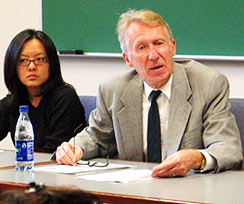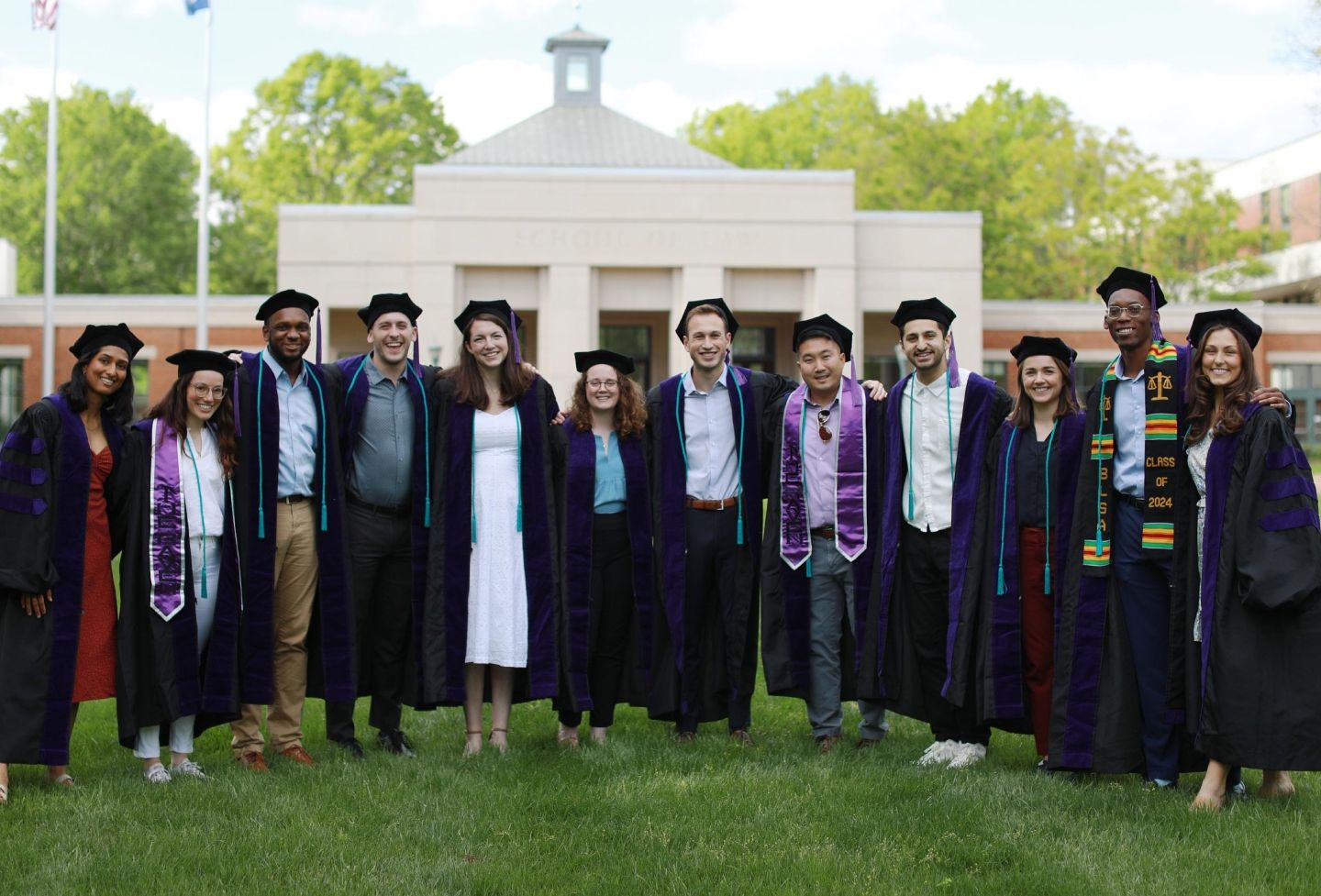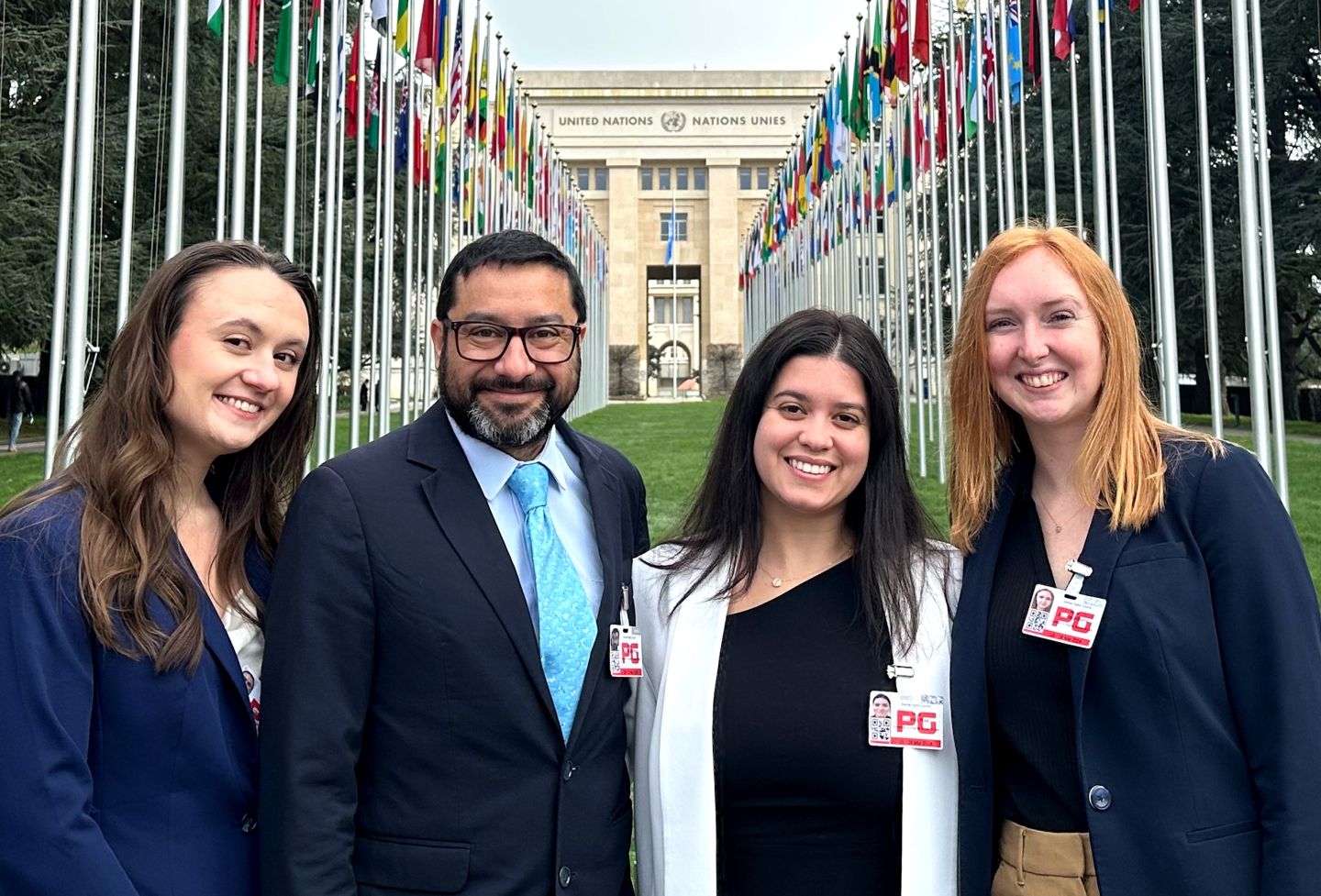European Leaders Favor EU Integration More Than Their Citizens Do, Hausmaninger Says

Political and economic integration is desired by Europe's national elites but not its ordinary citizens, who fear that a weakening of national sovereignty would cede control over their economic prerogatives, as well as endanger their own cultures, according to visiting professor Herbert Hausmaninger, a professor of law at the University of Vienna. Hausmaninger described himself as "cautiously optimistic" about the prospects of the European Union, the caution stemming from the economic challenges posed by its enlargement to the east. Hausmaninger, who has visited Virginia to teach Roman law and comparative law every year since 1981, spoke at the invitation of the J.B. Moore Society Sept. 23.
"I am Austrian, part of 'old Europe,'" he said. "I feel sympathy with those who feel threatened by the enlargement process, those who do not understand where the road will go." The 10 new members in eastern Europe slated to join next May will add 23 percent of the EU's territory, 20 percent of its population, and 4 percent of its GDP, he said, likening the economic burden on the EU to what Germany has faced in reabsorbing the former East Germany. The fact that lower wages are paid in the eastern countries worries workers in the west that their jobs may migrate to the new members once current barriers are gone, he said.
Despite the cost, Europe must proceed because it has a "moral obligation" to the eastern states to repair the legacy of the Cold War, he said, and because the bloody history of Europe in the last century can only be banished by binding national destinies more tightly. "We feel lucky not to have fallen under Soviet and communist rule," he said. Furthermore, "the absence of war means a lot in Europe. The Cold War could have turned hot at any moment." Integration is "a real opportunity to gain safety," plus improve efforts to deal with criminals who cross borders, he said.
A larger EU will require a common defense and foreign policy and other institutional reforms outlined in the Treaty of Nice, ratified earlier this year. The proposed constitution, drafted at the prodding of the Germans, Hausmaninger said, strengthens the European Parliament and provides for a president and foreign minister. Intended to improve the efficiency of the EU and reduce the possibility that the larger number of members could lead to gridlock in decision-making, the treaty's final form gave the integrationists victory in three-quarters of the issues under dispute, he said. Great Britain, the defender of the rights of member states, saw their veto power reduced but consoles itself that some rights remain recognized. Hausmaninger said the process of European integration amounts to "a permanent construction site" characterized by "a lot of muddling through." He regards it as inevitable that all European nations, including Switzerland, will join the Union.
If the constitution is adopted, it will not lead to an American-style federal system, he said. "We should not push the idea of 'the United States of Europe' too hard. People will not be ready for that for a long time." The concept of the federal state is a "19th-century one and not useful for the 21st century," he said. What's needed is a sense of dual identity, one national and one "European." Signs that such awareness is developing are expectations that school children learn two languages beside their native one, the increasing coverage of news from other countries and the ability to cross borders without presenting a passport. The impact of the Euro has been positive because it has reduced transaction costs, he said.
In answers to student questions, Hausmaninger said the EU has mishandled the matter of Turkey's entry. "Turkey should have been given all the rights of the EU in a separate agreement. Most of Turkey is in Asia; admitting it causes problems with Russia.
"Turkish elites are Westernized and have adopted Western values," he said, "but the population of 80 million includes how many Islamic fundamentalists?" Earlier he had commented that European culture has Judeo-Christian Roots, but that today religion plays very little role in shaping its continental identity.
European monetary stability is also being undermined somewhat by France and Germany, he said, who act in their parochial interest when it suits. "The big players do what they want and the smaller states wonder why they should observe [fiscal] discipline at such great cost."
The cost of absorbing the eastern nations is also an unsettling factor. "Financial drains will make themselves felt," he predicted. "How long will Germany be willing, or be able, to pay for European integration?"
Founded in 1819, the University of Virginia School of Law is the second-oldest continuously operating law school in the nation. Consistently ranked among the top law schools, Virginia is a world-renowned training ground for distinguished lawyers and public servants, instilling in them a commitment to leadership, integrity and community service.


